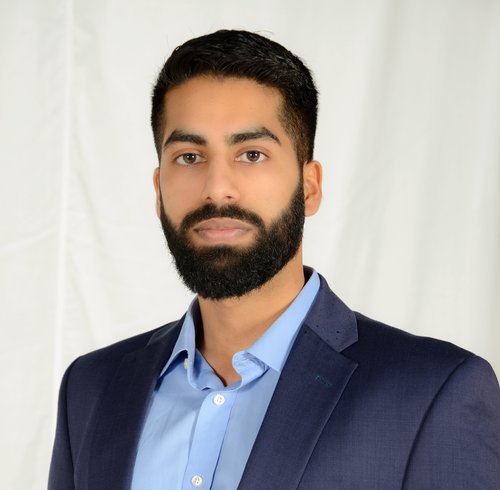Angel Investor Spotlight: Joban Bal
Wondering who these crazy people are that keep investing in local startups? Well we’ve been asking ourselves the same question. We’d like to share what we’ve been learning from our own Startup TNT investment community. They have tips to share with founders and first-time investors on investing (and life!).
I had the chance to sit down with one of our investors, Joban Bal. Joban’s focus for his entrepreneurial ventures, consulting, and investments is on using exponential technologies to create an abundant future for all. He's the Founder and President of the One Blood For Life Foundation, and holds various advisory and board roles across businesses and non-profit organizations. He’s also currently a fellow and Vancouver site co-lead at HaloHealth, Canada’s physician angel group, and a mentor and judge for entrepreneurship classes at University of Calgary’s Haskayne School of Business.
He now translates his experiences from various successful ventures to his advisor, operator, and investor roles. He is an MD Candidate and Wesbrook Scholar at the University of British Columbia, and an Abundance360 Scholar in Singularity University’s highest level program.
AA: Hey Joban! Thanks for chatting with me today. Let’s get right to it - why do you choose to do angel investing?
JB: Hey Amanda! So I came to this space by pursuing things I was passionate about and doubling down on what I excelled at. I really enjoy solving problems, working on innovative ideas, and translating frameworks from different fields to create novel ways of doing things. Angel investing is one way I pursue that. It also allows me to be surrounded with like-minded people who are working on creating innovations to make our lives better and sometimes helping solve some of the biggest challenges we are facing as a society. Plus, I really like working with entrepreneurs and providing whatever support and resources I can. I think that helping to create this value for others has been a key factor in the successes I have had to date.
AA: That’s so awesome that helping others has led to your own success. Ok, so after your experience in the Life Sciences Summit and Cleantech Summit, what do you now know and want to pass onto others?
JB: There are many ways to approach angel investing, but I think one of the best ways to start is by becoming more involved in your startup ecosystem and solving problems for others. In this positive sum game of entrepreneurship and innovation, by providing value to entrepreneurs and others in the ecosystem, you will become an invaluable resource.
Plus, I think that there are some basics about the logistics that anyone making angel investments for the first time should try to learn. For example, risk management, investment vehicles, investing criteria, illiquidity, etc. Beyond that, experience and expertise of all kinds can be translated in some form when working in the startup ecosystem. It goes without saying, as investors and advisors, we can learn tons from everyone!
AA: Agreed! We can all learn from one another. Alright, so let’s talk about investment groups. What makes TNT different from other groups you've been part of?
JB: TNT has a very welcoming atmosphere and by design, it provides a path for experienced angel investors to share their wisdom with newer and first-time angel investors. A lot of the investors also come with expertise in complementary areas, creating something that I like to think of as akin to the Swiss cheese model of risk mitigation. Subject area experts can narrow in on the due diligence for certain startups, while others focus on their strengths for each deal (ex. term sheets, IP, competitive market analysis, etc), and collectively, a well thought out decision can be made. Everyone is able to learn in a very collaborative environment, in the best way, by doing.
AA: And what do you think are some of the big investing mistakes someone can make?
JB: Simply put, any investor just starting to make angel investments should not over-allocate to any single venture deal and not risk a large part of their net worth to this asset class.
A Mark Twain quote that I find that can be very relevant to investing and risk management and especially relevant to angel investing: “It ain’t what you don’t know that gets you into trouble. It’s what you know for sure that just ain’t so.”
AA: And what do you think founders/startups need to keep in mind when they’re pitching to investors?
JB: Having heard many hundreds of pitches and seen over a thousand pitch decks, I would say there are some key things that every founder pitching needs:
Make sure the audience can tell what it is that your company does, at a high level, within the first minute of your pitch.
Make sure to talk about yourself, how you came up with this idea, and why you’re the right founder(s) to execute this plan.
Investors and advisors involved with startups at the very early stages are often investing in people first and ideas second.
Don’t be afraid to ask for help. I have yet to meet anyone who is not willing to help, whether it’s with advice, with an introduction, or resources.
AA: Awesome! Love your point about asking for help. Ok, last question. Why do you think it's important to invest in local companies?
JB: I love giving back to my local community and supporting entrepreneurs and changemakers around me. Many of the charitable initiatives I have been involved in have focused on local grassroots action, and I know exactly how impactful that can be. I also like to support under-represented entrepreneurs and especially underdogs when others might not see their potential.
AA: That’s so great. Thanks for chatting with me today, Joban! Appreciate all of your insights.
JB: No problem! :)

